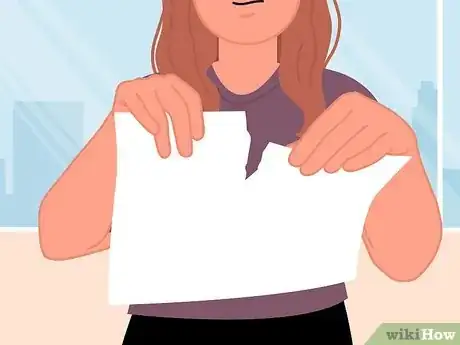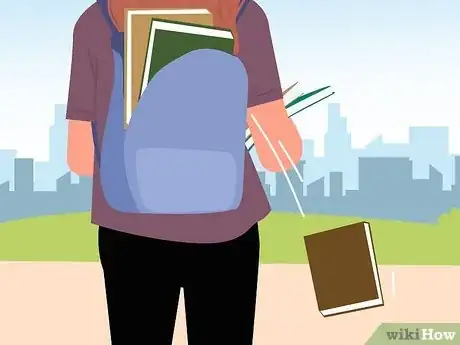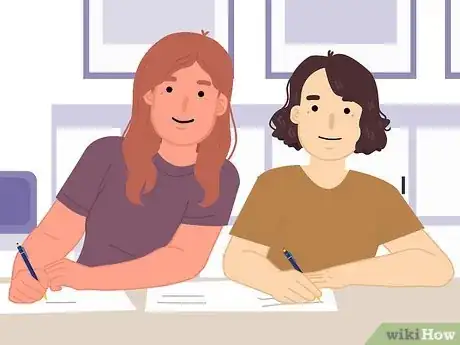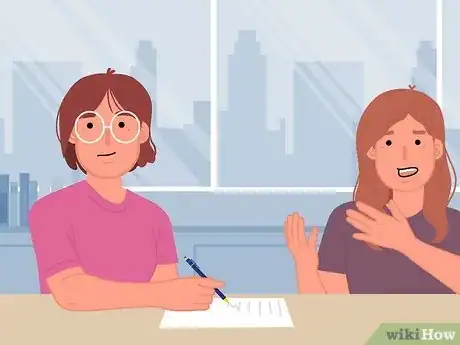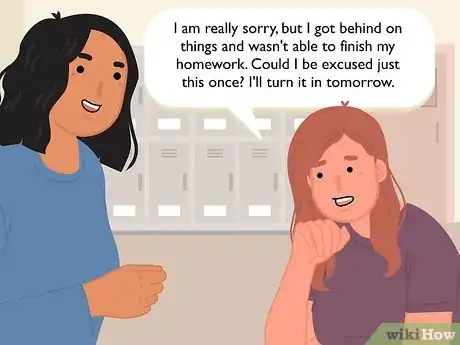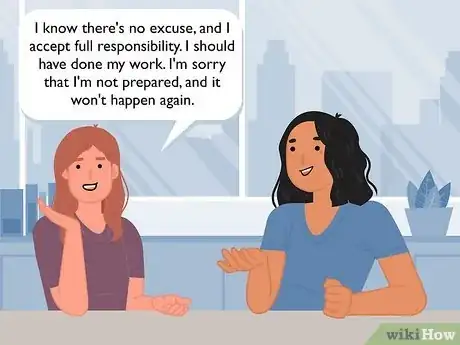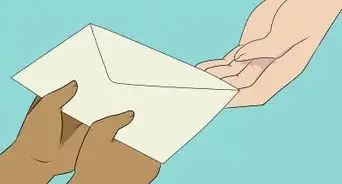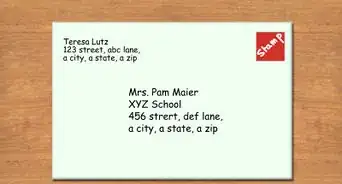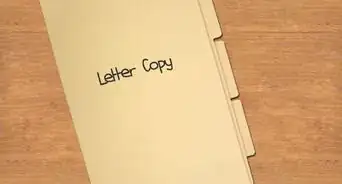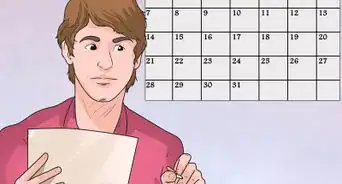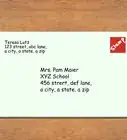This article was co-authored by Alicia Oglesby. Alicia Oglesby is a Professional School Counselor and the Director of School and College Counseling at Bishop McNamara High School outside of Washington DC. With over ten years of experience in counseling, Alicia specializes in academic advising, social-emotional skills, and career counseling. Alicia holds a BS in Psychology from Howard University and a Master’s in Clinical Counseling and Applied Psychology from Chestnut Hill College. She also studied Race and Mental Health at Virginia Tech. Alicia holds Professional School Counseling Certifications in both Washington DC and Pennsylvania. She has created a college counseling program in its entirety and developed five programs focused on application workshops, parent information workshops, essay writing collaborative, peer-reviewed application activities, and financial aid literacy events.
This article has been viewed 863,962 times.
Ideally, you will always be ready for class and have your homework completed. Sometimes, however, life gets in the way and you aren’t prepared. There are several methods for developing an excuse to give your teacher for why you don’t have your homework ready, ranging from honest to deceptive.
Steps
Inventing an Elaborate Excuse
-
1Make invented excuses sound as plausible as possible. If your only option seems to be making up a more elaborate excuse—or if you just want to be daring—do so carefully. Many common excuses, like “my dog ate my homework,” are familiar to teachers and they will not believe them. It is difficult to outsmart a teacher who has years of experience working with students and their excuses. Teachers are familiar with many excuses, and can often recognize outlandish ones as untrue. [1]
-
2Mutilate your assignment so you teacher can't tell you didn't actually do the work. Turn in the illegible or destroyed assignment, so that you can show your “proof” of your excuse.
- Crumple and tear a paper assignment. Then you can tell the teacher that it flew out the window and got run over or trampled on.
- Smear dirt and water on your assignment and claim it fell in a puddle. Make sure to write a few words (bonus points if it relates to the homework assignment) so that it looks believable.
- Spill something dark (like juice or ink) on the assignment so that it is illegible.
Advertisement -
3Make an excuse based on technological malfunctions.
- For instance, if you have to save work to a USB drive, you can claim to have a problem with the file.
- If you are asked to email or otherwise electronically send a homework file, you can “accidentally” send a different assignment, or the “wrong” draft (which could have just your name and the first part of the assignment, for instance). You might even be able to purchase corrupted files. [2]
- Be aware that your teachers can be tech-savvy and know all of these tricks, so you might have to get creative. [3]
-
4Try a less inventive excuses that might still work, like: your homework fell out of your bag, you grabbed the wrong folder at home, you had a funeral to go to.
-
5Fake it, when possible. For instance, with math work you can write random figures or answers to make it look like you did the work. This might take a lot of time, however, and if your teacher looks closely you might get caught.
-
6Avoid excuses that will backfire on you. For instance, if you tell your teacher that you forgot your homework in your locker, he or she can just ask you to go and get it, and you will be caught.
Buying Time and Stretching the Truth
-
1Make it seem like you did the work on time, even if you didn't.
- If the missed homework is for a class late in the day, you might be able to do the work before school, during another class, or during lunch or a break.
- You can hand in the wrong assignment—such as one from another class—or an old one from the same class. By the time your teacher notices the mistake, you will be able to complete the real homework, or just turn it in the next day and say you are sorry about the mix-up.
- Copy answers from a friend so you have something to turn in. Make sure your friend is ok with helping. This also only works for assignments where it is expected that students will have the same or similar answers. In some schools, even copying something like homework can merit a suspension. Remember to evaluate the situation and make a good decision as to whether or not you will copy homework off of a peer.
-
2Claim to be sick. Know that in many cases, you’ll need a written excuse from a doctor or clinic to prove to your teacher that you had to seek medical care, and weren’t able to complete your homework.
-
3Ask a parent to write an excuse for you.
- A dangerous move, you can forge a note from a parent explaining why you couldn't do your homework.
- If you decide to forge one, be warned that your teacher might know it’s a fake. If you are caught, you face punishment from both your parents and teacher.
Telling the Truth
-
1Try being honest. It’s best to simply tell the truth, and let your teacher know why you weren’t able to complete your homework. A sincere apology can go a long way.
- You might say something like "I am really sorry, but I got behind on things and wasn't able to finish my homework. Could I be excused just this once? I'll turn it in tomorrow and I won't be late again."
- Keep things simple and direct, rather than annoying your teacher with long, rambling excuses.
-
2Take responsibility for your lack of preparation. Admit that you did not complete the work, and accept blame rather than putting it off on someone or something else.
- This means saying something like: "I know there's no excuse, and I accept full responsibility. I should have done my work. I'm sorry that I'm not prepared, and it won't happen again."
- Doing so will display maturity and your teacher might respect your honesty.
-
3Think of legitimate reasons why you could not do the work. You will need something more than “I forgot” to convince your teacher.
- Perhaps you are overworked and stressed (this is especially persuasive at exam time).
- If circumstances beyond your control, like an illness or death in the family, have prevented you from doing your work, say so.
- You can also explain that you didn’t understand the assignment, or struggled with it, or felt rushed, and needed to give it more time.
-
4Remember that your teacher is busy, too. Try to say in advance that you were not able to do your homework.
- Your teacher is more likely to accept the excuse if you don’t spring it on him or her at the last minute.
- You might also be able to ask for an extension so that you can turn the homework in later.
- Know your teacher’s personality, and how flexible and forgiving he or she is. When you talk to your teacher, look sad, serious, agitated, etc. depending on your excuse.
Community Q&A
-
QuestionMy dog actually did eat my homework. What do I do in this situation?
 Community AnswerFirst, take your dog to the vet. Paper (especially with something like ink on it) can be bad for or even fatal to a dog. Then, you can get a letter from your parent or guardian saying that your dog did, in fact, eat your homework. If you take your dog to the vet, you could even get a note from them stating that the dog was seen for eating paper.
Community AnswerFirst, take your dog to the vet. Paper (especially with something like ink on it) can be bad for or even fatal to a dog. Then, you can get a letter from your parent or guardian saying that your dog did, in fact, eat your homework. If you take your dog to the vet, you could even get a note from them stating that the dog was seen for eating paper. -
QuestionHow do I excuse myself from unfinished homework because my parent threw it away by accident?
 Community AnswerJust approach your teacher before or after class and tell them exactly what happened. If possible, bring a signed note from your parent vouching that you're telling the truth.
Community AnswerJust approach your teacher before or after class and tell them exactly what happened. If possible, bring a signed note from your parent vouching that you're telling the truth. -
QuestionWhat do I do? My teacher gave us 2 weeks and class time to do the project, and it's due tomorrow and I basically haven't started.
 Community AnswerDon't waste your time on an excuse your teacher surely won't believe, seeing as you had lots of class time you could have done it in. Just focus on getting as much of the project done as you can before it's due. Even if you don't finish, you could still get partial credit, which is better than coming in with nothing.
Community AnswerDon't waste your time on an excuse your teacher surely won't believe, seeing as you had lots of class time you could have done it in. Just focus on getting as much of the project done as you can before it's due. Even if you don't finish, you could still get partial credit, which is better than coming in with nothing.
Warnings
- Be prepared to face the consequences if you get caught for using a deceptive excuse. Talk to your teacher in a mature way, explaining that you have a problem with procrastination, or feel overworked, or struggled with the assignment, etc.⧼thumbs_response⧽
- Try not to lie, a bad conscious can easily come from repetitive lying.⧼thumbs_response⧽
- If you get caught lying, it may lead to severe consequences with your teacher and parent/guardian.⧼thumbs_response⧽
References
About This Article
To excuse yourself from unfinished homework, try to make your excuse as believable as possible, like saying you were sick last night. If your homework was on a computer, claim your laptop crashed or your files were corrupted. Another thing you can try is handing in an old assignment. Then, do your actual homework before your teacher realizes. When they ask you about it, say that you accidentally handed in the wrong homework, and then give them the homework that was actually due. Even if you think you have a good excuse, your teacher’s probably heard it a dozen times before, so consider being honest with them and apologizing for falling behind. For example, say, “I’m sorry, but I wasn’t able to finish my homework this week. I had a lot of things to deal with. Is it okay if I turn it in tomorrow?” If you decide to be honest, try to tell your teacher at the beginning of class or even earlier in the day, which will make your excuse more realistic. For more tips, including how to pretend you lost your homework, read on!

